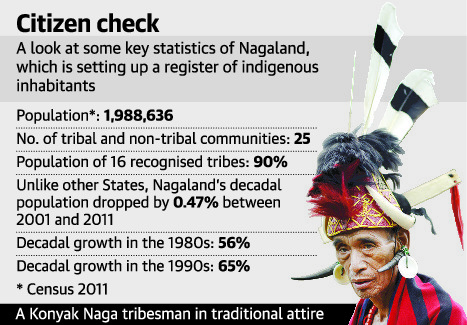Register of Indigenous Inhabitants of Nagaland | 14 Apr 2021
Why in News
Recently, an apex body of Naga tribes, Naga Hoho has cautioned the Nagaland Government with respect to preparation of the Register of Indigenous Inhabitants of Nagaland (RIIN), seen as a variant of Assam’s National Register of Citizens.
Key Points
- Background:
- The State government had formed a three-member Committee in 2019 for studying, examining, and recommending the implementation of RIIN.
- Functions of RIIN Committee was to determine:
- The eligibility criteria to be an indigenous inhabitant.
- Authority to authenticate claims of being indigenous.
- Place of registration as indigenous inhabitant.
- The basis of claims of being indigenous.
- The nature of documents that will be acceptable as proof of being indigenous.
- However, the exercise was suspended following protests from community-based and extremist organisations.
- Since then the Nagaland government has been trying to revive the RIIN exercise that was launched in July 2019 with the objective of preventing outsiders from obtaining fake indigenous certificates for seeking jobs and benefits of government schemes.
- Register of Indigenous Inhabitants of Nagaland:
- The RIIN will be prepared after an extensive survey with the help of a village-wise and ward-wise list of indigenous inhabitants based on official records. Also, It will be prepared under the supervision of each district administration.
- No fresh indigenous inhabitant certificate will be issued after the RIIN is completed except for children born to the State’s indigenous inhabitants who will be issued indigenous certificates along with birth certificates. The RIIN database will be updated accordingly.
- The RIIN will also be integrated with the online system for Inner-Line Permit, a temporary document non-inhabitants are required to possess for entry into and travel in Nagaland.
- The entire exercise will be monitored by the Commissioner of Nagaland. In addition, the state government will designate nodal officers of the rank of a Secretary to the state government.
- Naga’s Concern:
- Exclusion of Nagas:
- If RIIN implemented the identification process with 1st December, 1963 (the day Nagaland attained statehood) as the cut-off date for determining the permanent residents of the State, it is likely to exclude Nagas who have come from beyond the boundaries of Nagaland.
- Loss of Property:
- Naga tribes living in Assam, Manipur and Arunachal Pradesh in India and in Myanmar have a legitimate claim to their ancestral homeland.
- There are thousands of Nagas who have bought lands, built houses and settled down in Nagaland for several decades.
- In the absence of records such as land pattas, house taxes paid or enrolment in electoral rolls prior to 1st December, 1963 many procedural anomalies will crop up even within the so-called pure Nagas of Nagaland.
- Can Be treated as Illegal:
- The non-indigenous Nagas could be treated as “illegal immigrants” and their lands and property confiscated. The idea of the Nagas as a people to live together and their aspiration to live with self-determination will be irreparably damaged.
- Exclusion of Nagas:
Nagas
- Nagas are a hill people who are estimated to number about 2. 5 million (1.8 million in Nagaland, 0.6 million in Manipur and 0.1 million in Arunachal states) and living in the remote and mountainous country between the Indian state of Assam and Burma.
- There are also Naga groups in Myanmar.
- The Nagas are not a single tribe, but an ethnic community that comprises several tribes who live in the state of Nagaland and its neighbourhood.
- Nagas belong to the Indo-Mongoloid Family.
- There are nineteen major Naga tribes, namely, Aos, Angamis, Changs, Chakesang, Kabuis, Kacharis, Khain-Mangas, Konyaks, Kukis, Lothas (Lothas), Maos, Mikirs, Phoms, Rengmas, Sangtams, Semas, Tankhuls, Yamchumgar and Zeeliang.
Way Forward
- In an already volatile region where the Armed Forces (Special Powers) Act 1958 is routinely extended, it is best that Nagaland proceeds with caution in this enterprise. The RIIN should not ultimately become a vehicle to make outsiders of insiders.
- The NRC experiment in Assam witnessed extremely divisive political posturing. Other Northeastern states are sure to be watching with keen interest what is unfolding in Assam and Nagaland. Emotive political issues cannot be allowed to drive the compiling of a registry of citizens.

